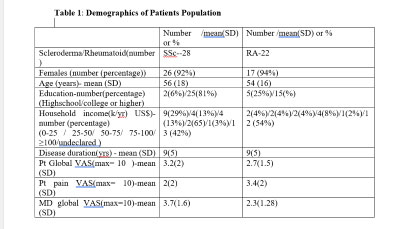Session Information
Date: Monday, November 14, 2022
Title: Systemic Sclerosis and Related Disorders – Clinical Poster III
Session Type: Poster Session D
Session Time: 1:00PM-3:00PM
Background/Purpose: In the era of emerging need to utilize remote technology-based health care services due to the COVID-19 pandemic, we wanted to evaluate patient satisfaction and challenges when using telemedicine for patients with systemic sclerosis (SSc) versus rheumatoid arthritis (RA); and to evaluate physician satisfaction when using telemedicine as well.
Methods: Fifty Pts with rheumatologic diseases {28 SSc , 22 RA } , More than 18 yrs old were enrolled in our study. Demographic data were obtained by chart review. Disease activity was reported using patient pain and physician global assessment of patient disease activity (MD global) (0-10 scale). The structured questionnaire primarily used closed-ended questions; however, patients were asked to express their opinions regarding the telemedicine experience, the quality of the consultation in comparison to in-person experience and their overall satisfaction with the telehealth consultation. For the same telehealth consultation, the rheumatologist also completed a structured questionnaire.
Results: Eighty six percent of pts were Females, mean age 55 yrs (SD17) with predominantly high degree of education: 40 pts (80%) had a college education or higher . Forty-four patients (88%) reported being satisfied with telehealth, Forty-three patients (86%) rated the quality of the consultations as excellent to good. Sixty nine percent of SSc patients were concerned about the lack of Physical Examination (PE), versus 27% of RA pts, (p-value =0.02). Fourteen percent of SSc patients spent more than 5 minutes in setting up the telemedicine call while only one of the RA patients (4.5%) reported such difficulty. SSc patients were approximately equally satisfied overall with telemedicine visits compared to the RA patients. Nevertheless, SSc patients reported numerically more technological issues than RA patients ( RA: 24 ;38% instances: SSc:38; 61% instances) p-value= 0.059)
Age, disease activity (MD global) and Income, emerged as prominent factors affecting the perception of the telemedicine visit. Older age groups were associated with more technical difficulties(P=0.0059 ). Pts with higher disease activity (MD global) reported more difficulties with technology during the telehealth visit(P=0.027). Lower income patients had numerically more concerns regarding lack of Physical Exam (P0.1), suggesting that telehealth might be associated with health inequity concerns. The majority (69 %) of SSc patients were concerned about the lack of PE, versus only 27% of RA pts (P -value =0.02).
In contrast with the patients, the rheumatologists were satisfied with the telehealth consultations in only 28 (56%) of the sessions. The main drawbacks were related to technical aspects of the virtual visit, and inability to do a full physical exam.
Conclusion: Overall patient satisfaction was high based on convenience and safety. Age, disease activity (MD global) and income emerged as major concerns to be considered in telemedicine platforms. We highlighted the vulnerable groups who had more concerns and challenges, to be considered when using a telemedicine platform.
To cite this abstract in AMA style:
Suliman Y, mumper J, Feldman G, Hay M, Furst D. Rheumatology Telemedicine Consults: Impact of Demographic Variability on Patient Perception in Systemic Sclerosis versus Rheumatoid Arthritis Pts [abstract]. Arthritis Rheumatol. 2022; 74 (suppl 9). https://acrabstracts.org/abstract/rheumatology-telemedicine-consults-impact-of-demographic-variability-on-patient-perception-in-systemic-sclerosis-versus-rheumatoid-arthritis-pts/. Accessed .« Back to ACR Convergence 2022
ACR Meeting Abstracts - https://acrabstracts.org/abstract/rheumatology-telemedicine-consults-impact-of-demographic-variability-on-patient-perception-in-systemic-sclerosis-versus-rheumatoid-arthritis-pts/



